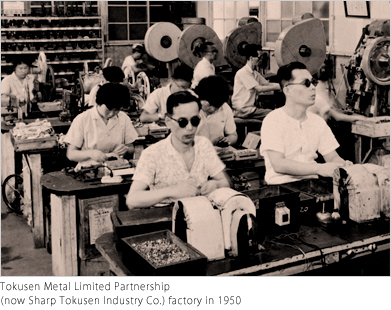1950
Gratitude to the Visually Impaired—Establishing a Special Metalworking Plant
It was an old visually impaired woman living in his neighborhood who took the young Tokuji by the hand and led him to his master’s house. Tokuji never forgot the warmth of her hand and always felt gratitude for her caring kindness. This woman went missing at the time of the Great Kanto Earthquake, but an opportunity presented itself to return the favor to those who were visually impaired, just like the woman. As a consequence of having been asked to do training during the war at the Nippon Lighthouse, an organization that assists persons with impaired vision, he opened a branch factory where persons who had lost their sight in the war could work. With a firm belief in the independence of the visually impaired, the engineers responded with earnest guidance, and after much hard work, they made it possible for the hands of the unsighted to do metal stamping and similar processes. Tokuji’s simple idea was based not so much on sympathy or dependence on the kindness of others; rather, he believed that happiness that comes from overcoming adversity through one’s own efforts is true and lasting happiness. In 1950, this plant was established as an independent company operated by the disabled individuals themselves. At present, it has expanded even further, and using advanced technologies, a number of persons with disabilities are playing an active role in product manufacturing at Sharp.


